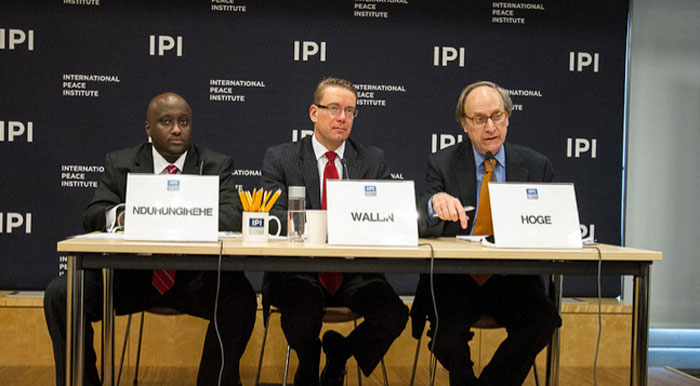
“Hybrid and support models are gaining prevalence, particularly among the UN and the AU . This reflects the changing nature of peacekeeping in Africa, especially the manner in which peacekeeping missions are composed, driven, and funded,” Olivier Nduhungirehe, Charge d’Affaires of the Permanent Mission of the Republic of Rwanda to the United Nations, told an IPI audience on May 8, 2012.
Mr. Nduhungirehe was speaking on a panel along with Stefan Wallin, the Minister of Defense of Finland, about how peacekeeping partnerships can contribute to sustainable peace and development in Africa.
The many different forms of cooperation taking place on the continent were examined, from multi-organization hybrid peacekeeping arrangements to bilateral training and capacity-building initiatives.
Mr. Nduhungirehe spoke in particular of the lessons from three peacekeeping missions in Sudan, Darfur, and Somalia, and cooperation amongst the African Union (AU) , United Nations (UN), and the European Union (EU).
“A hybrid mission benefits from a true joint ownership relationship and thus has experience much greater levels of coordination since AMIS.” It can provide “experience-sharing and organizational learning,” he said, explaining that UNAMIS’s relative success should be an example of a successful alternative peacekeeping model, where international organizations exploit their comparative advantage – the AU provides troops and the UN logistical support.
“Although AU ,EU, and UN cooperation has improved peacekeeping in Africa, majority of the support to AU is in the form of capacity-building, planning, and financial support. While these areas continue to be in need of support, these remain ad-hoc, fragmented, and sometimes politicized,” he continued.
“Cooperation amongst these actors can provide an alternative and viable model to traditional peacekeeping missions,” he said. “At the same time, such missions strengthen Africa’s capacity to respond to challenges to peace and stability in the region. However, there is much to improve in these missions.”
Mr. Wallin also reflected on how regional organizations’ work in global security has increased, in coordination with the UN. He gave the example of EU operations launched under mandate of the UN and to support UN missions, for example in the DRC and Chad.
He also said that it was critically important to include women in peacekeeping missions. “When it comes to preparations for certain operations, like the one ongoing on right now in Afghanistan…it’s very important that you have both women and men amongst your troops,” he said. “Some of the problems, some of the interviews that you complete with the local population might proceed more smoothly if you have people representing both sexes.”
Welcoming remarks were delivered by Terje Rød-Larsen, President of the International Peace Institute.
Warren Hoge, Senior Adviser for External Relations of the International Peace Institute, chaired the event.
Watch event:







